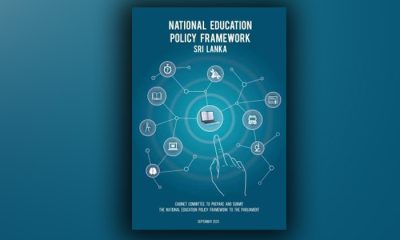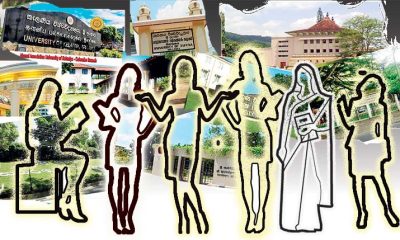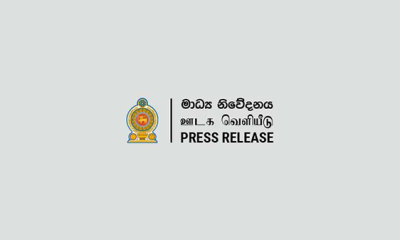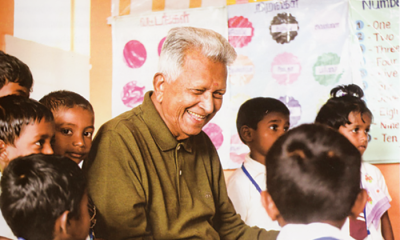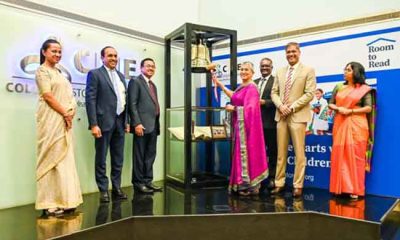Features
Film Series: Daughters of Destiny
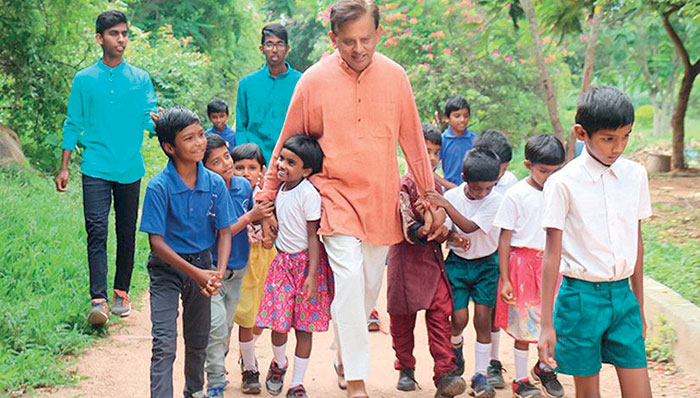
 I watched recently on Netflix a four-part series on a school built in Tamil Nadu close to Bangalore by a returned Indian American businessman and academic, originally from Kerala. He built a boarding school for Dalit children and runs it with his brother as head of management. The philanthropist lives in and devotes his time and energy to the school. Here are details:
I watched recently on Netflix a four-part series on a school built in Tamil Nadu close to Bangalore by a returned Indian American businessman and academic, originally from Kerala. He built a boarding school for Dalit children and runs it with his brother as head of management. The philanthropist lives in and devotes his time and energy to the school. Here are details:
The Boarding School
The school for Dalits or ‘untouchable’ children is named Shanti Bhavan founded in 1997 and serves the Baliganapalli area. A child each from the poorest of Dalit families is selected at age four years and enrolled in the school; 12 boys and 12 girls each year. They are given boarding facilities which means everything from food to clothes, and educated from pre KG or Nursery to Grade 12 until they enter universities and are helped further; or they go into jobs. Education is far from solely academic. Sports, social living niceties, guidance in growing up like preteen girls being given a lesson or two on puberty, are included.
The Principal addresses them almost daily at morning assembly and many are the teachers and counselors present, some of them Shanti Bhavan past pupils. The school is financed by the George Foundation – a non-profit charitable trust, which Abraham George set up on returning to India in January 1995, after a long absence. His intention was to reduce the injustices and inequalities in Baliganapalli and proximate areas, near Bangalore. His first project was the residential school which offers world class education in the English medium.
Undoubtedly, the school has been a great success. There must surely have been a reduction in the condition and treatment of downtrodden Dalits in Tamil Nadu and Bangalore areas. As of 2017, after 20 years of this school’s operations, the first batches of students count those employed in companies like Mercedes Benz, Goldman Sachs, Ernst and Young and other businesses worldwide. Six graduates received admission to Stanford, Dartmouth, Princeton, Northwestern universities. These success stories surely would be much greater at present.
Abraham George
The businessman is Abraham George and his brother, Ajit George. Further details of this working and serving philanthropist are apt here.
George was born and brought up in the seaside city of Trivandrum, Kerala; second son of four children. At age 14, he was admitted to the National Defence Academy and became a second-lieutenant in the Indian Army and was posted in 1966 to the Northeast Frontier that borders China. He was injured in a dynamite explosion after 10 months. Recovered, he was sent to the Pakistan border. After three years of service he was found to suffer a hearing disability which could not be treated in India.
His mother was in the US teaching physics and working in NASA. He transferred to his mother’s home in Alabama, underwent successful surgery and started a new life. He enrolled in the Stern School of Business in New York University, and decided on a teaching career. Not for long though. The Chemical Bank, part of JP Morgan Chase Bank, recruited him. He soon started his own company – Multinational Computer Models – and was consultant to many prestigious banks. He kept his links with India being on the boards of Vellore Christian Medical College and other institutions. He returned to his land of birth in the latter half of 1990 with money and admirable ideas to uplift people, particularly those stigmatized by the Indian caste system. He is now recognized as one of the world’s leading social entrepreneurs.
The Film Series
Titled Daughters of Destiny, the four part series is an original English language Netflix documentary released in 2017, which its Oscar winning screen writer plus director, Vanessa Roth, filmed during a protracted period of seven years, tracing the education, schooling and character build-up of five girls; four from teen age to around 20 years of age and one kid of four – Thenmozhi – who in the final episode is seen going through a grand ceremony all dressed up having reached puberty.
Three succeed in achieving their ambitions: Manjula – a nursing sister; Karthika Annuamadai – lawyer in a corporate job in Delhi; Shilpa Anthony Raj – journalist; and Preetha – undecided but probably continuing her higher studies. The lawyer’s mother was a bonded labourer in a stone quarry, living in a dilapidated hut close to it. The educated daughter succeeds in preparing a lawsuit which releases her mother from bonded labour and enables the workers in the quarry to buy their own pieces of land.
The four series are titled: The Untouchables, A great expectation, People say your life is your own, and What is written on the forehead.
Incidents and moments in the series that sank into my impressed mind are very many. One is that the children were trained to study and converse in English from age four. Thus Thenmozhi is shown struggling when reading a text in an Indian language in class. Boarding life became fun after the initial sorrow of parting from family. The most emphatic and impressive was the strong bond between the five girls and their mothers, three of the mothers being single parents.
During school vacations, all Shanti Bhavan children go back to their homes, invariably very poor and basic, but the children adapt easily from the comforts and decency of the school boarding. Another impressive factor was the close and affectionately fatherly tie Abraham George maintains with the children, often addressing the children at general assemblies. He meets and speaks with parents with not a trace of condescension. Also impressive was the close collaboration of his brother – financial and administrative manager – with teachers of the school.
Screen writer and director
Both of the above jobs and that of executive producer were achieved very successfully in Daughters of Destiny by Vanessa Roth – American film writer, producer and director of non-fiction films. She spent more than seven years filming the four series, probably living in Shanti Bhavan when she visited. She won the 2008 Academy Award for her documentary Freehold and Emmy Honors Award and IDA nomination for best documentary series for this film series, plus awards for many of her other documentaries. She earned a master’s degree in social work and a minor in family law from Columbia University and lives in New York with her family of three children. Her father is the Jewish Academy Award winning screen writer Eric Roth and mother archeologist Linda Roth.
A Sri Lankan philanthropist in education
We Sri Lankans are fortunate in having people and organizations who see those in depressed social conditions and help. I have written in this column of an organization and an individual who have, through help in education, uplifted entire families: CandleAid and a retired UK general practitioner. The doctor did not and does not want to be named. He had been helping a school in the Vanni for long, but on his annual long holiday in Sri Lanka in 2020 he had to stay put due to Covid travel restrictions. He loved it and got thoroughly involved full time in the school he helped develop.
He built a girls’ hostel since these poor girls used to cycle to school through deserted areas. Then he built a hostel for boys. The girls have five rooms and the boys four, each room with 15 beds: this being the maximum where people can live in harmony. It’s called a Dunbar number. He travels to the school at least monthly and spends days living in a part of the boys’ hostel.
He pays boardong fees for many children. He financed and supervised a dairy and poultry farm for the school, taking saplings from Colombo of the best variety of mango and other kinds of fruit. Thus the school hostel is self-sufficient in most of its food requirements. He arranges for good weekend lunches for the children of a more depressed area, also in the Vanni. His fruit tree planting campaign has spread to households in the area.
He was born, bred and earned his medical degree in this country. After serving in various hospitals around the island, he migrated to Britain. He has returned for good to spend his entire sterling pension and more on the school he helped develop.
Features
SL urged to use GSP+ to the fullest to promote export development
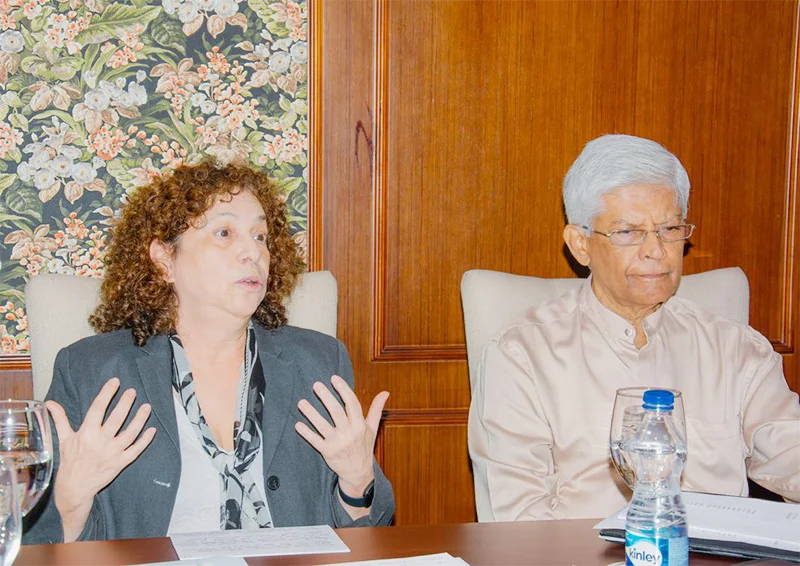
 Sri Lanka needs to take full stock of its current economic situation and use to the maximum the potential in its GSP+ facility for export sector growth. In the process, it should ensure that it cooperates fully with the European Union. The urgency of undertaking these responsibilities is underscored by the issues growing out of the recent US decision to sweepingly hike tariffs on its imports, though differentially.
Sri Lanka needs to take full stock of its current economic situation and use to the maximum the potential in its GSP+ facility for export sector growth. In the process, it should ensure that it cooperates fully with the European Union. The urgency of undertaking these responsibilities is underscored by the issues growing out of the recent US decision to sweepingly hike tariffs on its imports, though differentially.
These were principal ‘takes’ for participants in the Pathfinder Foundation’s Ambassadors’ Roundtable forum held on April 8th at the Colombo Club of the Taj Samudra. The main presenter at the event was Ms. Carmen Moreno Raymundo, Ambassador of the European Union to Sri Lanka and the Maldives. The forum was chaired by Ambassador Bernard Goonetilleke, Chairman, Pathfinder Foundation. The event brought together a cross-section of the local public, including the media.
Ms. Moreno drew attention to the fact Sri Lanka is at present severely under utilizing its GSP+ facility, which is the main means for Sri Lanka to enter the very vast EU market of 450 million people. In fact the EU has been Sri Lanka’s biggest trading partner. In 2023, for instance, total trade between the partners stood at Euros 3.84 billion. There is no greater market but the EU region for Sri Lanka.
‘However, only Sri Lanka’s apparel sector has seen considerable growth over the years. It is the only export sector in Sri Lanka which could be said to be fully developed. However, wider ranging export growth is possible provided Sri Lanka exploits to the fullest the opportunities presented by GSP+.’
Moreno added, among other things: ‘Sri Lanka is one among only eight countries that have been granted the EU’s GSP+ facility. The wide-ranging export possibilities opened by the facility are waiting to be utilized. In the process, the country needs to participate in world trade in a dynamic way. It cannot opt for a closed economy. As long as economic vibrancy remains unachieved, Sri Lanka cannot enter into world trading arrangements from a strong position. Among other things, Sri Lanka must access the tools that will enable it to spot and make full use of export opportunities.
‘Sri Lanka must facilitate the private sector in a major way and make it possible for foreign investors to enter the local economy with no hassle and compete for local business opportunities unfettered. At present, Lanka lacks the relevant legal framework to make all this happen satisfactorily.
‘Sri Lanka cannot opt for what could be seen as opaque arrangements with bilateral economic partners. Transparency must be made to prevail in its dealings with investors and other relevant quarters. It’s the public good that must be ensured. The EU would like to see the local economy further opening up for foreign investment.
‘However, it is important that Sri Lanka cooperates with the EU in the latter’s efforts to bring about beneficial outcomes for Sri Lankans. Cooperation could be ensured by Sri Lanka fully abiding by the EU conditions that are attendant on the granting of GSP+. There are, for example, a number of commitments and international conventions that Sri Lanka signed up to and had promised to implement on its receipt of GSP+ which have hitherto not been complied with. Some of these relate to human rights and labour regulations.
‘Successive governments have pledged to implement these conventions but thus far nothing has happened by way of compliance. GSP+ must be seen as an opportunity and not a threat and by complying with EU conditions the best fruits could be reaped from GSP+. It is relevant to remember that GSP+ was granted to Sri Lanka in 2005. It was suspended five years later and restored in 2017.
‘The importance of compliance with EU conditions is greatly enhanced at present in view of the fact that Sri Lanka is currently being monitored by the EU with regard to compliance ahead of extending GSP+ next year. A report on Sri Lanka is due next year wherein the country’s performance with regard to cooperating with the EU would be assessed. The continuation of the facility depends on the degree of cooperation.
‘A few statistics would bear out the importance of Sri Lanka’s partnership with the EU. For example, under the facility Sri Lanka benefits from duty free access in over 66% of EU tariff lines. The highest number of tourist arrivals in Sri Lanka in 2023 was from the EU’s 27 member states. Likewise, the EU’s 27 member states rank second in the origin of inflows of foreign exchange to Sri Lanka; with Italy, France and Germany figuring as the main countries of origin. Eighty five percent of Sri Lanka’s exports to the EU market benefits from GSP+. Thus, the stakes for the country are high.’
Meanwhile, President, In-house Counsel & Legal Advisor, The European Chamber of Commerce of Sri Lanka, John Wilson said: ‘GSP+ should be seen as not only an opportunity but also as a necessity by Sri Lanka in the current international economic climate. ‘Implementation of local laws is what is needed. Considering the pressures growing out of the US imposed new tariff regime, a good dialogue with the EU is needed.
‘Sri Lanka’s level of business readiness must be upped. Among the imperatives are: An electronic procurement process, Customs reforms, a ‘National Single Window’, stepped-up access to land by investors, for example, a clear policy framework on PPPs and reform of the work permits system.’
It ought to be plain to see from the foregoing that Sri Lanka cannot afford to lose the GSP+ facility if it is stepped-up economic growth that is aimed at. It would be in Sri Lanka’s best interests to remain linked with the EU, considering the aggravated material hardships that could come in the wake of the imposition of the US’ new tariff regime. Sri Lanka would need to remain in a dialogue process with the EU, voice its reservations on matters growing out of GSP+, if any, iron out differences and ensure that its national interest is secured.
Features
SENSITIVE AND PASSIONATE…

Chit-Chat
Chiara Tissera
Mrs. Queen of the World Sri Lanka 2024, Chiara Tissera, leaves for the finals, in the USA, next month
I had a very interesting chat with her and this is how it all went:
1. How would you describe yourself?
I am a sensitive and passionate individual who deeply cares about the things that matter most to me. I approach life with a heart full of enthusiasm and a desire to make meaningful connections.
2. If you could change one thing about yourself, what would it be?
Actually, I wouldn’t change a thing about myself because the person I am today, both inside and out, is the result of everything I’ve experienced. Every part of me has shaped who I am, so I embrace both my strengths and imperfections as they make me uniquely me.
3. If you could change one thing about your family, what would it be?
If there’s one thing I could change about my family, it would be having my father back with us. Losing him six years ago left a void that can never be filled, but his memory continues to guide and inspire us every day.
4. School?
I went to St. Jude’s College, Kurana, and I’m really proud to say that the lessons I gained during my time there have shaped who I am today. My school and teachers instilled in me values of hard work, perseverance and the importance of community, and I carry those lessons with me every day. I was a senior prefect and was selected the Deputy Head Prefect of our college during my tenure.
5. Happiest moment?
The happiest moment of my life so far has been winning the Mrs. Sri Lanka 2024 for Queen of the World. It was a dream come true and a truly unforgettable experience, one that fills me with pride and gratitude every time I reflect on it.
6. What is your idea of perfect happiness?
Happiness is a deeply personal and multifaceted feeling that often comes from a sense of contentment, fulfillment and well-being. For me, perfect happiness is in moments of joy, peace and accomplishments … and also being surrounded by my loved ones.
7. Are you religious?
Yes, I’m a very religious person. And I’m a firm believer in God. My faith guides me through life, providing strength, dedication and a sense of peace in every situation. I live by the quote, ‘Do your best, and God will do the rest.’
8. Are you superstitious?
I’m not superstitious. I believe in making my own decisions and relying on logic and faith rather than following superstitions.
9. Your ideal guy?
My ideal guy is my husband. He is compassionate, understanding and is always there to support me, no matter what. He’s my rock and my best friend – truly everything I could ever want in a partner.
10. Which living person do you most admire?
The living person I admire the most is definitely my mummy. Her strength, love and unwavering support has shaped me into who I am today. She is my role model and she inspires me every day with her wisdom and kindness.
11. Your most treasured possession?
My most treasured possession is my family. They are the heart of my life, providing me with love, support and strength. Their presence is my greatest blessing.
12. If you were marooned on a desert island, who would you like as your companion?
I would like to have my spouse as my companion. Together, we could make the best of the situation, supporting each other, sharing moments of laughter and finding creative ways to survive and thrive.
13. Your most embarrassing moment?
There’s quite a few, for sure, but nothing is really coming to mind right now.
14. Done anything daring?
Yes, stepping out of my comfort zone and taking part in a pageant. I had no experience and was nervous about putting myself out there, but I decided to challenge myself and go for it. It pushed me to grow in so many ways—learning to embrace confidence, handle pressure, and appreciate my own uniqueness. The experience not only boosted my self-esteem but also taught me the value of taking risks and embracing new opportunities, even when they feel intimidating.”
15. Your ideal vacation?
It would be to Paris. The city has such a magical vibe and, of course, exploring the magical Eiffel Tower is in my bucket list. Especially the city being a mix of history culture and modern life in a way that feels timeless, I find it to be the ideal vacation spot for me.
16. What kind of music are you into?
I love romantic songs. I’m drawn to its emotional depth and the way they express love, longing a connection. Whether it’s a slow ballad, a classic love song or a more modern romantic tune these songs speak to my heart.
17. Favourite radio station?
I don’t have a specific radio station that I like, but I tend to enjoy a variety of stations, depending on my mood. Sometimes I’ll tune into one for a mix of popular hits, other times I might go for something more relaxing, or a station with a certain vibe. So I just like to keep it flexible and switch it up.
18. Favourite TV station?
I hardly find the time to sit down and watch TV. But, whenever I do find a little spare time, I tend to do some spontaneous binge – watching, catching whatever interesting show is on at that moment.
19 What would you like to be born as in your next life?
Mmmm, I’ve actually not thought about it, but I’d love to be born as someone who gets to explore the world freely – perhaps a bird soaring across continents.
20. Any major plans for the future?
Let’s say preparing and participating in the international pageant happening in the USA this May. It’s an exciting opportunity to represent myself and my country on a global stage. Alongside this, I am dedicated to continuing my social service work as a title holder, striving to make a meaningful difference in the lives of others through my platform.
Features
Fresher looking skin …

 The formation of wrinkles and fine lines is part of our ageing process. However, if these wrinkles negatively impact appearance, making one look older than they actually are, then trying out some homemade remedies, I’ve listed for you, this week, may help in giving your skin a fresher look.
The formation of wrinkles and fine lines is part of our ageing process. However, if these wrinkles negatively impact appearance, making one look older than they actually are, then trying out some homemade remedies, I’ve listed for you, this week, may help in giving your skin a fresher look.
* Banana:
Bananas are considered to be our skin’s best friend. They contain natural oils and vitamins that work very perfectly to boost our skin health. Skincare experts recommend applying the banana paste to the skin.
Take a ripe banana and mash a quarter of it until it becomes a smooth paste. Apply a thin layer of the banana paste on your skin and allow it to sit for 15 to 20 minutes before washing it off with warm water.
* Olive Oil:
Olive oil works as a great skin protector and many types of research suggest that even consuming olive oil may protect the skin from developing more wrinkles. Olive oil contains compounds that can increase the skin’s collagen levels. Yes, olive oil can be used as a dressing on your salads, or other food, if you want to consume it, otherwise, you can apply a thin layer of olive oil on your face, neck and hands and let it stay overnight.
* Ginger:
Ginger serves to be a brilliant anti-wrinkle remedy because of the high content of antioxidants in it. Ginger helps in breaking down elastin, which is one of the main reasons for wrinkles. You can have ginger tea or grate ginger and have it with honey, on a regular basis.
* Aloe Vera:
The malic acid present in Aloe Vera helps in improving your skin’s elasticity, which helps in reducing your wrinkles. Apply the gel once you extract it from the plant, and leave it on for 15-20 minutes. You can wash it off with warm water.
* Lemons:
Lemons contain citric acid, which is a strong exfoliant that can help you get rid of your dead skin cells and wrinkles. Also, as an astringent and a cleansing agent, it helps to fade your wrinkles and fine lines. You can gently rub a lemon slice in your wrinkled skin and leave it on for 10-15 minutes. Rinse afterwards and repeat this process two to three times a day.
* Coconut Oil:
Coconut oil contains essential fatty acid that moisturises the skin and helps to retain its elasticity. You can directly apply the coconut oil, and leave it overnight, after gently massaging it, for the best results.
-

 Business4 days ago
Business4 days agoColombo Coffee wins coveted management awards
-

 Business6 days ago
Business6 days agoDaraz Sri Lanka ushers in the New Year with 4.4 Avurudu Wasi Pro Max – Sri Lanka’s biggest online Avurudu sale
-

 Features5 days ago
Features5 days agoStarlink in the Global South
-

 Business7 days ago
Business7 days agoStrengthening SDG integration into provincial planning and development process
-

 Business6 days ago
Business6 days agoNew SL Sovereign Bonds win foreign investor confidence
-

 Features2 days ago
Features2 days agoSri Lanka’s Foreign Policy amid Geopolitical Transformations: 1990-2024 – Part III
-

 Features5 days ago
Features5 days agoModi’s Sri Lanka Sojourn
-

 Midweek Review2 days ago
Midweek Review2 days agoInequality is killing the Middle Class


